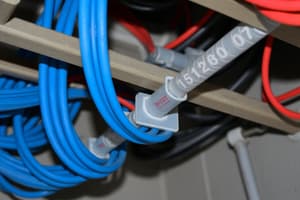Podcast
Questions and Answers
What is the purpose of an electrical conduit?
What is the purpose of an electrical conduit?
- To regulate electrical current
- To insulate electrical appliances
- To protect and route electrical wiring (correct)
- To generate electrical power
What materials can electrical conduit be made of?
What materials can electrical conduit be made of?
- Metal, plastic, fiber, and fired clay (correct)
- Aluminum, copper, zinc, and steel
- Wood, glass, rubber, and concrete
- Brass, bronze, titanium, and nickel
Who typically installs electrical conduit at the site of installation of electrical equipment?
Who typically installs electrical conduit at the site of installation of electrical equipment?
- Carpenters
- HVAC technicians
- Electricians (correct)
- Plumbers
What are wiring regulations that often specify the use, form, and installation details of conduit?
What are wiring regulations that often specify the use, form, and installation details of conduit?
What was used for interior wiring protection in early electric lighting installations?
What was used for interior wiring protection in early electric lighting installations?
Flashcards
Purpose of Electrical Conduit
Purpose of Electrical Conduit
To protect and route electrical wiring.
Materials for Electrical Conduit
Materials for Electrical Conduit
Made of metal, plastic, fiber, or fired clay.
Who Installs Electrical Conduit?
Who Installs Electrical Conduit?
Typically installed by electricians at job sites.
Wiring Regulations for Conduit
Wiring Regulations for Conduit
Signup and view all the flashcards
Historical Wiring Protection
Historical Wiring Protection
Signup and view all the flashcards
Study Notes
Purpose of Electrical Conduit
- Protects electrical wiring from physical damage, moisture, and chemical exposure.
- Provides a structured pathway for electrical conductors, ensuring safety and organization.
- Facilitates easier upgrades or repairs to wiring without considerable disruption.
Materials Used for Electrical Conduit
- Rigid Metal Conduit (RMC) made from galvanized steel or aluminum, offering durability and strength.
- Intermediate Metal Conduit (IMC) is lighter than RMC but provides similar protection.
- PVC Conduit is non-metallic, lightweight, and resistant to corrosion, suitable for wet environments.
- Flexible Metal Conduit (FMC) allows for bending and maneuvering in installations, adapting to complex layouts.
Installation of Electrical Conduit
- Typically installed by licensed electricians or electrical contractors at the site of electrical equipment.
- Electricians assess project requirements to determine the best type and layout of conduit needed.
Wiring Regulations
- National Electrical Code (NEC) often governs the use, form, and installation specifics of conduits.
- Local building codes may impose additional requirements and standards for electrical installations.
- Compliance with these regulations ensures safety, reliability, and proper function of electrical systems.
Early Interior Wiring Protection
- Knob-and-tube wiring was commonly used for interior wiring protection in early electric lighting installations.
- This technique involved porcelain knobs and tubes to support and insulate wires, though it is now largely outdated due to safety concerns.
Studying That Suits You
Use AI to generate personalized quizzes and flashcards to suit your learning preferences.




